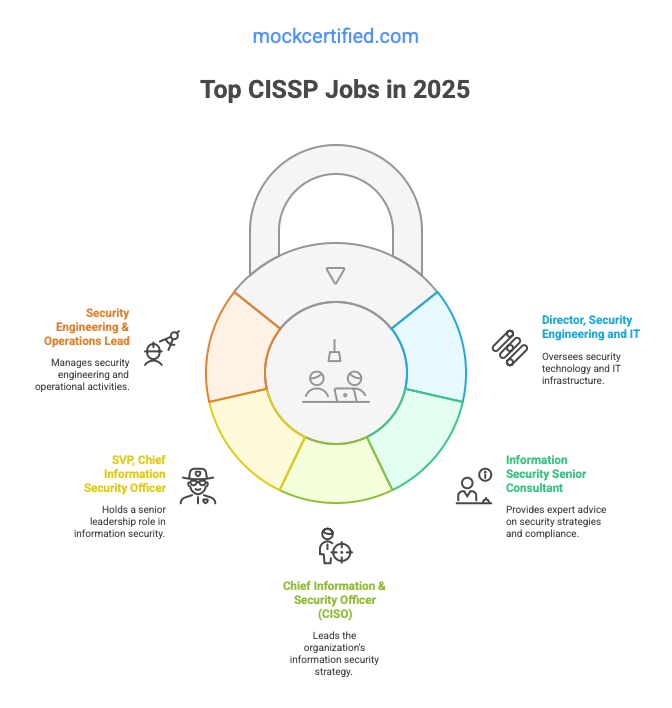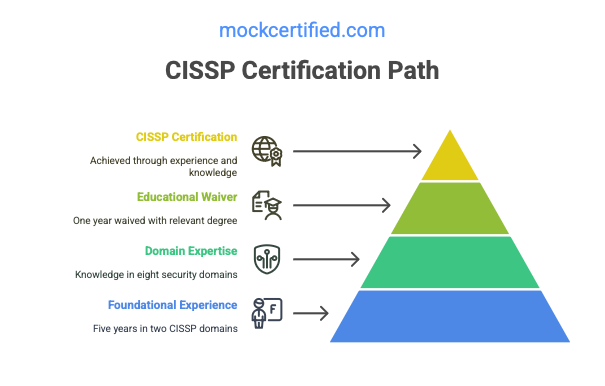
The CISSP (Certified Information Systems Security Professional) remains one of the premier cybersecurity certifications worldwide. (ISC)² describes it as “the most globally recognized certification in the information security market,” and employers highly prize it.
The CISSP covers a broad range of security topics – from technical architecture to management and risk – so earning it signals that you have both deep technical knowledge and a strategic understanding of security.
CISSP Jobs Paying Over $150K Right Now

Cybersecurity leadership and specialized roles continue to command top salaries in 2025. In particular, senior positions explicitly requiring a CISSP often pay well over $150K total compensation. Below are several of the highest-paying CISSP jobs currently hiring in the US, with details drawn from recent 2025 listings:
Director, Security Engineering and IT (Wrapbook)【8†】
Total Comp: $240K (base $192K–$294K【8†】, plus typical bonuses/equity)
Employer: Wrapbook (a fintech/entertainment payroll startup)
Responsibilities: Lead the company’s security program and IT operations, overseeing secure application and cloud infrastructure, risk management, incident response, and compliance (e.g. SOC2, production payroll security).
Experience: 8+ years security/IT experience, often in fast-growing tech firms.
Information Security Senior Consultant (Leidos)【10†】【34†】
Total Comp: ≈$177K (base $126K–$228K, plus benefits/bonuses)
Employer: Leidos (a large government technology/security contractor)
Responsibilities: Advise on federal security projects (FISMA compliance, DoD/IAM, cloud security), conduct risk assessments, develop cybersecurity plans, and support system accreditation.
Experience: 10+ years in information security; often requires TS/SCI clearance.
Why CISSP: The role requires broad security expertise for complex federal systems; CISSP is explicitly listed as a requirement.
Chief Information & Security Officer (Graham & Co.)【20†】
Total Comp: $150K–$200K (base)
Employer: Graham & Co. (a Denver real-estate/proptech firm)
Responsibilities: As CISO (and CIO), define overall IT strategy and security program, manage risk and compliance (e.g. PCI, privacy), oversee network infrastructure and cloud services, and advise executives/board.
Experience: Typically 10+ years in IT/security (including financial services/regulatory environments).
SVP, Chief Information Security Officer (West Coast Community Bank)【23†】【45†】
Total Comp: $150K–$175K (base)
Employer: West Coast Community Bank (regional financial institution)
Responsibilities: Lead all information security and compliance for the bank, including risk management, policy development, vendor security, and oversight of cybersecurity operations. Acts as senior risk executive reporting to the board.
Experience: 10+ years in IT security (≥5 in banking)
Security Engineering & Operations Lead (IBSS Corp)【43†】
Total Comp: $150K–$200K (base)
Employer: IBSS Corp (federal contractor supporting NOAA Cyber Center)
Responsibilities: Manage 24/7 IT and security operations for a federal cybersecurity center, including data center and network management (TICAP infrastructure), continuous monitoring/incident response, and long-range security planning.
Experience: Senior leadership in secure IT operations (often 7–10+ years).
Senior Application Security Architect (Agile5 Technologies)【48†】
Total Comp: >$150K (project-rate equivalent)
Employer: Agile5 (IT consulting firm for federal agencies)
Responsibilities: Design and secure enterprise application architectures, integrate security into CI/CD pipelines, conduct code reviews, threat modeling, and ensure compliance with standards (NIST, OWASP).
Experience: 8+ years (or 6+ w/ MS) in application security, typically for DoD/CISA clients.
Why CISSP: CISSP is required to validate comprehensive security expertise across the application development lifecycle.
Staff Security Engineer (Archer Aviation)【93†】
Total Comp: $163K–$190K (base)
Employer: Archer Aviation (electric air taxi manufacturer)
Responsibilities: Architect and implement enterprise security solutions for cloud and on-prem systems, enforce DevSecOps practices, manage identity/access controls, and ensure overall product and data security in a high-growth aviation startup.
Experience: Senior (typically 7–10+ years in cybersecurity engineering).
Why CISSP: The listing notes “CISSP or equivalent industry certification”ziprecruiter.com as required, underscoring the need for a certified security expert in this critical role.
Sources: Recent 2025 job postings and salary data【8†】【10†】【20†】【23†】【34†】【43†】【48†】【93†】 were used to identify these roles and details.
Eligibility and Experience Requirements

To become a CISSP, you need solid professional experience. The official rule is five years of full-time work in at least two of the eight CISSP domains.
Those eight domains include areas like Security and Risk Management, Asset Security, Software Development Security, and others.. In practical terms, that means most people take the CISSP after working in IT or cybersecurity for several years. (If you have a four-year degree in computer science, IT, or a related field, one year of that experience can be waived – so you’d need four years of work instead of five.)
There’s also an approved list of other certifications (like Security+, CASP+, CISA, etc.) that can each count as one year of experience if you earn them. Even part-time work or internships can count toward the requirement, so don’t worry if your experience isn’t in a single full-time job.
If you don’t yet have the required experience, you can still take the CISSP exam. In that case, you’ll earn the title Associate of (ISC)² instead of the full CISSP certification. As an Associate, you have up to six years to gain the remaining work experience (or education credits) needed for CISSP.
Once you pass the exam, you also need to have your application endorsed by another (ISC)² certified professional, but (ISC)² will help connect you with an endorser if you don’t know one personally.
Exam Format, Domains, and Costs
The CISSP exam is challenging by design, reflecting its comprehensive scope. As of 2025, it’s delivered via Computerized Adaptive Testing (CAT). That means the test adjusts in real time based on your answers: if you answer correctly, the next question is harder, and if you answer incorrectly, the next question is a bit easier.
You have 3 hours total to complete the exam, which consists of 100 to 150 questions of various formats (mostly multiple-choice, plus some advanced question types). To pass, you need to score at least 700 out of 1000 on ISC²’s scale.
The exam covers all eight CISSP domains from the official Common Body of Knowledge.
These domains are: Security and Risk Management; Asset Security; Security Architecture and Engineering; Communication and Network Security; Identity and Access Management (IAM); Security Assessment and Testing; Security Operations; and Software Development Security. Each domain makes up a significant chunk of the test (for example, Security and Risk Management is around 16% of the exam).
In practice, this means you’ll need a well-rounded grasp of topics from legal/compliance issues to network security to secure software development. ISC² updates these domain topics regularly through a Job Task Analysis, so you can be confident the material is current for real-world security needs.
In terms of exam cost, the CISSP is $749 (USD) per attempt as of early 2025. (ISC² sets this fee and can change, so always check the latest ISC² exam pricing.) If you need to reschedule or cancel your test appointment, there are modest fees ($50 to reschedule, $100 to cancel).
Also, plan for the annual maintenance fee once you earn CISSP: it’s $135 per year. (If you’re an Associate of ISC², that fee is only $50 until you complete your experience.) Aside from fees, think about study materials: official textbooks or guides run on the order of $50–$100 each, and live training courses or boot camps can add to your costs. But most people consider CISSP an investment – a relatively small exam fee for the career boost it can provide.
Common Questions and Concerns
People often have many questions when they start thinking about the CISSP. Here are answers to a few frequently asked questions:
“Can I take the CISSP exam without meeting the experience requirements?”
Yes, you can. You’ll pass the exam, but you’ll be awarded the title Associate of (ISC)² instead of CISSP until you finish your experience. Once you have the full five years (or four with a degree) in two domains, your Associate status can be converted into full CISSP certification.
“How hard is the CISSP exam?”
It’s generally considered tough, mainly due to its breadth. It’s not about rote facts; many questions are scenario-based and test your understanding of concepts. A common mistake is underestimating how much material is covered. For example, you must know both technical details and high-level management principles. Proper preparation (see Study Tips below) is the key.
If you put in the hours with good resources and practice exams, many people do pass. Remember that exam questions require critical thinking.
ISC² warns against ignoring question format; you need to read carefully and identify exactly what is being asked, rather than just memorizing facts. Also, keep in mind the exam’s adaptive style: manage your time well and don’t spend too long on any one question.
“How many questions and how much time?”
You get 3 hours for 100–150 questions. The actual number of questions depends on how the CAT algorithm adjusts. You must reach that passing scale (700/1000). Practice timed exams to get a feel for the pace – don’t save all the easy questions and then run out of time on harder ones.
“What if I don’t pass?”
You can retake it, but there are rules. ISC² allows up to four attempts per year (one attempt at a time). After your first try, you must wait 30 days to retest; after a second attempt, 60 days; after a third, 90 days.
(You must also pay the exam fee each time.) Use any extra weeks to review what topics gave you trouble.
“Is CISSP still worth it in 2025?”
Absolutely. Despite the rise of new tech, CISSP remains very relevant. (ISC² actively updates the exam – the current outline took effect in April 2024– to include modern topics like cloud security, mobile devices, IoT, and even considerations for AI.) The credential is widely respected; it’s often required or strongly preferred for senior security positions.
It tends to lead to better job prospects and higher salary offers. Remember the flipside: as security jobs get more complex, having the CISSP on your resume is a strong signal that you have up-to-date knowledge.
Career Paths and Salaries in North America
The CISSP can open doors to many cybersecurity roles. In the U.S., dozens of job titles either require or highly value a CISSP. Infosec Institute notes that over 70,000 U.S. job postings specifically ask for CISSP certification.
These range from security managers and analysts to architects and even CISO positions.
For example, a Security Manager (who leads security teams and policies) or a Security Architect (who designs secure networks) often lists CISSP in the job description.
Because CISSP is aimed at experienced professionals, the typical salaries are
Common Myths and Exam Mistakes
There are plenty of misconceptions about CISSP. Let’s clear up a few:
- Myth: “CISSP is only for technical experts.” Not true. The exam includes a lot of policy, risk management, governance, and legal concepts, as well as technology. In fact, some CISSPs come from backgrounds in auditing, management, or consulting. Project managers or compliance officers often earn the CISSP as well. It’s designed for any security professional who plays a leadership or design role, not just low-level tech staff.
- Myth: “CISSP is outdated in modern times.” Also false. ISC² updates CISSP regularly to keep pace with the latest threats and tech. The exam outline was refreshed in 2024, and topics like cloud security, mobile devices, Internet of Things, and AI-related risks are included. We saw that the last big update (2021) added cloud, IoT, and mobile content, and ISC²’s current Job Task Analysis process means future changes will reflect real-world needs.
- Myth: “It’s too hard – most people fail.” While challenging, the CISSP is passable with good preparation. The key mistake some candidates make is underestimating how wide the exam is. If you only study parts of the domains or try to memorize answers, you’ll struggle. Instead, treat the exam like solving problems: practice scenario questions and focus on understanding concepts. Lots of folks actually pass on the first try after disciplined study. Remember, training companies might promise high pass rates, but there’s no substitute for your own hard work.
- Mistake: “Studying one thing deeply, ignoring others.” This is a common exam mistake. The CISSP covers eight domains roughly equally, so you need to learn each area. ISC² notes that candidates often don’t allocate enough study time to every domain. Make sure you plan to review everything, from cryptography basics to security law. Use practice exams to identify which areas you’re weak in, and spend extra time there.
- Mistake: “Not practicing with exam-like questions.” The CISSP exam likes to ask “best answer” questions in story form, not just straight facts. Simply reading a book isn’t enough. Use official practice questions, online simulators, or study group quizzes so you get used to the style. ISC²’s own study guide and forum discussions recommend repeatedly taking full practice tests. This also helps with time management – the CAT format doesn’t let you go back, so you must pace yourself through all questions.
- Myth: “CISSP preparation costs are unbeatable.” It’s true there are costs (exam fee, study materials, courses), but think of it as an investment. Many organizations even sponsor CISSP training because the payoff is higher. Some countries offer grants or employer-funded programs for IT security training. And once certified, CISSP holders are proven to earn more on average, so the long-term return can be very good.
Study Tips for CISSP Success
If you’ve made up your mind to pursue CISSP jobs, here are some friendly study tips for 2025:
Make a study plan. Don’t cram the night before – the exam covers a lot. Set aside regular study time (even an hour a day) and map out which domains to focus on week by week. (Infosec advises covering each domain thoroughly and revisiting tough spots later.) If you work full-time, plan for 3–6 months of prep; if you can study full-time, you might finish in 8–12 weeks. The key is consistency.
Use a variety of resources. Mix different learning methods. Read an official ISC² CISSP study guide to get the core theory, but also watch video lectures or take a training course for topics you find hard. Join CISSP forums or subreddits to ask questions and see how others explain things. Flashcards or apps (like Anki) can help memorize key terms (e.g., the NIST security model, or parts of the CIA triad). As one study guide suggests, combining practice tests, study guides, and guided training usually beats relying on just one source.
Practice exams are essential. Take many full-length practice tests under timed conditions. This will get you comfortable with answering 100+ questions in a 3-hour window. It also helps you learn the exam logic – questions often describe a scenario and then ask you to choose the best next step or principle. When you do practice tests, review every wrong answer. If a certain domain always trips you up, go back and study it. The official ISC² site even offers free practice quizzes for each domain.
Study smart, not just hard. Focus on understanding why the answer is correct, not just memorizing facts. For example, if a question involves a firewall rule scenario, practice drawing diagrams or writing out the rationale. That way, in the exam, you can reason through unfamiliar twists. Also, keep the big picture in mind: CISSP often tests management-level thinking (like risk analysis or business impact) as much as technical details.
Remember the ISC² Code of Ethics. Questions sometimes test your adherence to ethics (like in phishing, password sharing, etc.). Make sure you know the four principles of the CISSP code of ethics (protect society, act honorably, provide competent service, and advance the profession). In many scenario questions, the ethically correct choice wins.
Don’t panic on exam day. Trust your preparation. Read each question slowly and underline keywords (e.g., “first,” “best,” or “least”). If you don’t know an answer, make the most educated guess and move on – with CAT, you can’t go back anyway, so it’s better not to get stuck. Manage your time: roughly 1–2 minutes per question on average, adjusting if some are notably longer. If you finish early, use spare time to review any flagged questions mentally (since you can’t actually go back, this means double-checking you didn’t misread something).
With the right approach, passing the CISSP on your first or second try is within reach. Thousands do it every year. Keep your tone focused and positive (“I’m learning this to advance my career!”), And don’t be afraid to take breaks to stay fresh. Building this certification into your career can be a game-changer: as one Infosec guide says, it can give you “better job prospects” and “higher salaries,”.
In summary, CISSP in 2025 is as rigorous and rewarding as ever. The requirements (five years’ experience, eight domains) are the same fundamentals that have underpinned the certification for decades. What’s new is the up-to-date content and constantly evolving exam outline.
Cybersecurity remains one of the hottest career fields, with roles galore and a worldwide talent shortage. If you plan well, study consistently, and learn from reliable resources, you can earn your CISSP jobs and reap its long-term benefits – whether that’s a salary bump, a promotion, or simply the satisfaction of mastering a vast subject. Good luck on your CISSP journey!



